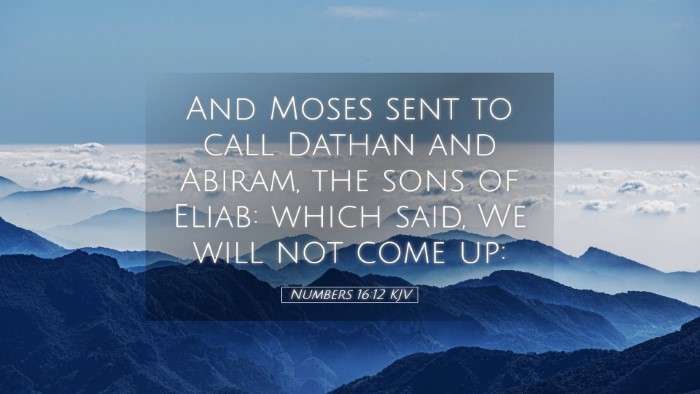Commentary on Numbers 16:12
Text of Numbers 16:12: “And Moses sent to call Dathan and Abiram, the sons of Eliab: which said, We will not come up.”
Introduction
This verse is situated in the context of a significant rebellion led by Korah against Moses and Aaron's leadership. The actions and responses of Dathan and Abiram serve as an essential study of rebellion, leadership, and divine authority.
Contextual Background
The events surrounding Numbers 16 emphasize the tension between the established order of leadership appointed by God and the challenges posed by those who desired to usurp that authority for personal gain. The rebellion of Korah and his followers marks a critical moment in Israel's journey through the wilderness.
Dathan and Abiram: Profiles of Rebellion
Dathan and Abiram, alongside Korah, represent a faction that undermines Moses' authority. Their refusal to respond signifies not only a challenge to Moses but indicates deeper issues of discontent among the Israelites.
Insights from Matthew Henry
Matthew Henry elaborates on the implications of Dathan and Abiram’s response. He notes that their refusal to come when summoned by Moses reflects a hardened heart, resistant to acknowledging divine authority. Their rebellion, driven by envy and ambition, illustrates the dangers of dissent that arise from dissatisfaction with God’s chosen leaders. Dathan and Abiram's rejection serves as a reminder of the folly of opposing divinely appointed authority.
Insights from Albert Barnes
Albert Barnes highlights the significance of Moses' action in sending for them. It was not a mere invitation but a summons to accountability. Barnes suggests that their subsequent refusal reveals the boldness and audacity of their rebellion. He underscores that they sought to diminish Moses' authority and legitimacy, asserting their independence in a manner that rejected God's order.
Insights from Adam Clarke
Adam Clarke emphasizes the tenor of Dathan and Abiram's response, interpreting it as prideful defiance. He points out that their claim of noncompliance illustrates a common human failing: resisting rightful authority. Clarke asserts that their attitude is emblematic of a broader pattern where individuals elevate personal grievances over divine order.
Theological Implications
The refusal of Dathan and Abiram prompts reflections on the nature of rebellion against God-ordained leadership. Their actions denote a profound misunderstanding of authority and responsibility within the community of faith.
- Authority and Obedience: The text brings forth the theme of obedience to God’s chosen leaders, stressing that rebellion often stems from a lack of understanding of divine structure.
- Consequences of Rebellion: The eventual fate of Dathan and Abiram serves as a dire warning of the consequences of defiance. God’s response to rebellion illustrates His commitment to preserving His covenant people.
- The Role of Leadership: The dynamics between Moses and the rebels reveal the complexities of leadership. Leaders must balance authority with humility while demanding accountability from those under their charge.
Lessons for Modern Believers
For pastors, students, and theologians today, the narrative invites reflection on how we approach leadership within the church and community.
- Respect for Authority: Believers are reminded of the necessity to honor and respect leaders who have been placed in charge by God.
- The Dangers of Discontent: The story warns against allowing personal grievances to fester, as such attitudes can lead to destructive behavior that harms the community.
- Call to Humility: Rather than aspiring to positions of authority for recognition or power, believers are called to serve with humility and a heart aligned with God’s will.
Conclusion
The refusal of Dathan and Abiram to heed Moses’ call is more than a historical account; it serves as a theological reflection on authority, rebellion, and the importance of responding rightly to God’s leadership. The lessons embedded in this narrative continue to resonate within the faith community, challenging us to examine our attitudes toward authority and our own roles within God’s kingdom.


